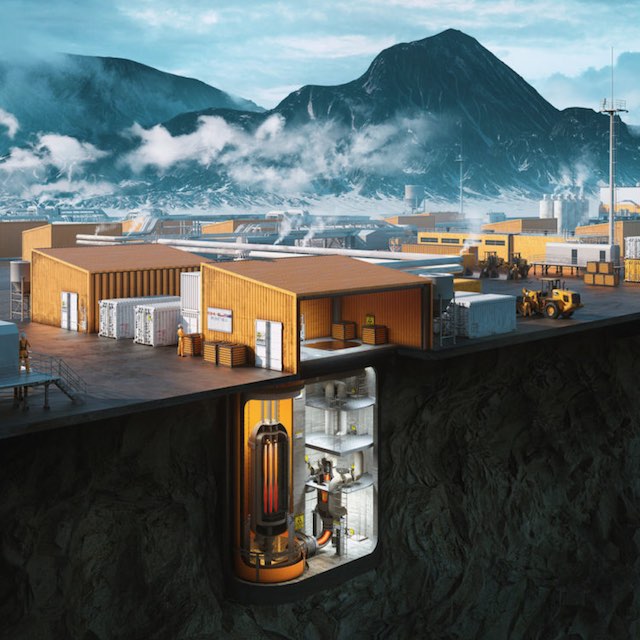Alberta
Alberta is getting serious about nuclear power

Image from CanadianMiningJournal.com
New funding to study small modular reactors
Alberta has approved funding for a multi-year study that will explore how small modular nuclear reactors could be safely, technically and economically deployed for oil sands operations.
Alberta is investing $7 million from the Technology Innovation and Emissions Reduction Fund to help Cenovus Energy study how small modular reactors could be used in northern Alberta, and what additional information might be needed to pursue regulatory approval in the future.
As outlined in the province’s Emissions Reduction and Energy Development Plan and A Strategic Plan for the Deployment of Small Modular Reactors, Alberta is committed to responsible and innovative energy development, and small modular reactors have the potential to provide zero-emissions energy and further reduce emissions from Alberta’s oil sands in the years to come.
“A few years ago, the idea of expanding nuclear energy use was on the back burner – that is no longer the case. In Alberta, small modular nuclear reactors have the potential to supply heat and power to the oil sands, simultaneously reducing emissions and supporting Alberta’s energy future. This funding is the foundation for that promising future. I want to thank Cenovus Energy and Emissions Reduction Alberta for their leadership in this work.”
Small modular reactor technology involves scalable and versatile nuclear reactors that could potentially supply non-emitting heat and power to the province’s oil sands. Provincial funding delivered through Emissions Reduction Alberta is supporting the work needed to determine how this technology could be effectively used in Alberta.
“Small modular reactors have great potential to supply non-emitting energy in many different applications, including the oil sands. Further studies like this are needed to see if the technology is suitable for those industrial applications. If so, it could be transformational for the in-situ oil sands sector and other sectors in Alberta.”
“This enabling study is a great example of the collaborative approach we’ll need to help us reach our ambition of net-zero emissions from our operations by 2050. We’re exploring multiple technologies that would help significantly reduce our emissions, and small modular reactors show potential. This study will help us understand if this possible solution is economical and technically viable.”
Cenovus Energy’s $26.7-million enabling study will look at whether small modular reactor technology could be applied to steam-assisted gravity drainage projects in the oil sands, which drill into the reservoir and inject steam to soften the oil. Alberta Innovates recently released a study on the feasibility of using small modular nuclear reactors in steam-assisted gravity drainage operations, which is an early step to see if this technology could be part of Alberta’s long-term solutions to reducing emissions from industry operations. While there is currently no project being planned, this study frames the discussion around what is possible in the years ahead.
“Building off the work previously supported by Alberta Innovates, the success of Cenovus’s small modular reactor ERA-funded enabling study could provide substantial economic and environmental advantages throughout Alberta’s industrial sector, helping to advance a clean energy future for Canada.”
Quick facts
- Funding for this project comes from Emissions Reduction Alberta’s Industrial Transformation Challenge.
- Any future adoption of small modular reactor technology in Alberta would require an extensive regulatory and engagement process. The province is currently working to ensure the regulatory framework is in place and ready should private industry pursue this technology.
- On Sept. 12, an Alberta-Ottawa working group on emissions reduction and energy development met for the first time. The working group agreed to commence the development of a regulatory framework for small modular reactor technology and continue work on federal and provincial incentives for CCUS, hydrogen and other emissions-reducing technologies.
- Alberta, Saskatchewan, Ontario and New Brunswick released A Strategic Plan for the Development of Small Modular Reactors in 2022. The plan commits the Alberta Utilities Commission and Alberta Energy Regulator to deliver findings on areas of overlap, uncertainty and duplication between the federal and provincial regulatory systems to Alberta’s government in 2023.
- The Canadian Nuclear Safety Commission regulates all stages of life of nuclear power plants in Canada, starting from the initial environmental assessment to decommissioning. The approval process takes several years and offers opportunities for public participation.
Alberta
Premier Smith: Canadians support agreement between Alberta and Ottawa and the major economic opportunities it could unlock for the benefit of all

From Energy Now
By Premier Danielle Smith
Get the Latest Canadian Focused Energy News Delivered to You! It’s FREE: Quick Sign-Up Here
If Canada wants to lead global energy security efforts, build out sovereign AI infrastructure, increase funding to social programs and national defence and expand trade to new markets, we must unleash the full potential of our vast natural resources and embrace our role as a global energy superpower.
The Alberta-Ottawa Energy agreement is the first step in accomplishing all of these critical objectives.
Recent polling shows that a majority of Canadians are supportive of this agreement and the major economic opportunities it could unlock for the benefit of all Canadians.
As a nation we must embrace two important realities: First, global demand for oil is increasing and second, Canada needs to generate more revenue to address its fiscal challenges.
Nations around the world — including Korea, Japan, India, Taiwan and China in Asia as well as various European nations — continue to ask for Canadian energy. We are perfectly positioned to meet those needs and lead global energy security efforts.
Our heavy oil is not only abundant, it’s responsibly developed, geopolitically stable and backed by decades of proven supply.
If we want to pay down our debt, increase funding to social programs and meet our NATO defence spending commitments, then we need to generate more revenue. And the best way to do so is to leverage our vast natural resources.
At today’s prices, Alberta’s proven oil and gas reserves represent trillions in value.
It’s not just a number; it’s a generational opportunity for Alberta and Canada to secure prosperity and invest in the future of our communities. But to unlock the full potential of this resource, we need the infrastructure to match our ambition.
There is one nation-building project that stands above all others in its ability to deliver economic benefits to Canada — a new bitumen pipeline to Asian markets.
The energy agreement signed on Nov. 27 includes a clear path to the construction of a one-million-plus barrel-per-day bitumen pipeline, with Indigenous co-ownership, that can ensure our province and country are no longer dependent on just one customer to buy our most valuable resource.
Indigenous co-ownership also provide millions in revenue to communities along the route of the project to the northwest coast, contributing toward long-lasting prosperity for their people.
The agreement also recognizes that we can increase oil and gas production while reducing our emissions.
The removal of the oil and gas emissions cap will allow our energy producers to grow and thrive again and the suspension of the federal net-zero power regulations in Alberta will open to doors to major AI data-centre investment.
It also means that Alberta will be a world leader in the development and implementation of emissions-reduction infrastructure — particularly in carbon capture utilization and storage.
The agreement will see Alberta work together with our federal partners and the Pathways companies to commence and complete the world’s largest carbon capture, utilization and storage infrastructure project.
This would make Alberta heavy oil the lowest intensity barrel on the market and displace millions of barrels of heavier-emitting fuels around the globe.
We’re sending a clear message to investors across the world: Alberta and Canada are leaders, not just in oil and gas, but in the innovation and technologies that are cutting per barrel emissions even as we ramp up production.
Where we are going — and where we intend to go with more frequency — is east, west, north and south, across oceans and around the globe. We have the energy other countries need, and will continue to need, for decades to come.
However, this agreement is just the first step in this journey. There is much hard work ahead of us. Trust must be built and earned in this partnership as we move through the next steps of this process.
But it’s very encouraging that Prime Minister Mark Carney has made it clear he is willing to work with Alberta’s government to accomplish our shared goal of making Canada an energy superpower.
That is something we have not seen from a Canadian prime minister in more than a decade.
Together, in good faith, Alberta and Ottawa have taken the first step towards making Canada a global energy superpower for benefit of all Canadians.
Danielle Smith is the Premier of Alberta
Alberta
A Memorandum of Understanding that no Canadian can understand

From the Fraser Institute
The federal and Alberta governments recently released their much-anticipated Memorandum of Understanding (MOU) outlining what it will take to build a pipeline from Alberta, through British Columbia, to tidewater to get more of our oil to markets beyond the United States.
This was great news, according to most in the media: “Ottawa-Alberta deal clears hurdles for West Coast pipeline,” was the top headline on the Globe and Mail’s website, “Carney inks new energy deal with Alberta, paving way to new pipeline” according to the National Post.
And the reaction from the political class? Well, former federal environment minister Steven Guilbeault resigned from Prime Minister Carney’s cabinet, perhaps positively indicating that this agreement might actually produce a new pipeline. Jason Kenney, a former Alberta premier and Harper government cabinet minister, congratulated Prime Minister Carney and Premier Smith on an “historic agreement.” Even Alberta NDP Leader Naheed Nenshi called the MOU “a positive step for our energy future.”
Finally, as Prime Minister Carney promised, Canada might build critical infrastructure “at a speed and scale not seen in generations.”
Given this seemingly great news, I eagerly read the six-page Memorandum of Understanding. Then I read it again and again. Each time, my enthusiasm and understanding diminished rapidly. By the fourth reading, the only objective conclusion I could reach was not that a pipeline would finally be built, but rather that only governments could write an MOU that no Canadian could understand.
The MOU is utterly incoherent. Go ahead, read it for yourself online. It’s only six pages. Here are a few examples.
The agreement states that, “Canada and Alberta agree that the approval, commencement and continued construction of the bitumen pipeline is a prerequisite to the Pathways project.” Then on the next line, “Canada and Alberta agree that the Pathways Project is also a prerequisite to the approval, commencement and continued construction of the bitumen pipeline.”
Two things, of course, cannot logically be prerequisites for each other.
But worry not, under the MOU, Alberta and Ottawa will appoint an “Implementation Committee” to deliver “outcomes” (this is from a federal government that just created the “Major Project Office” to get major projects approved and constructed) including “Determining the means by which Alberta can submit its pipeline application to the Major Projects Office on or before July 1, 2026.”
What does “Determining the means” even mean?
What’s worse is that under the MOU, the application for this pipeline project must be “ready to submit to the Major Projects Office on or before July 1, 2026.” Then it could be another two years (or until 2028) before Ottawa approves the pipeline project. But the MOU states the Pathways Project is to be built in stages, starting in 2027. And that takes us back to the circular reasoning of the prerequisites noted above.
Other conditions needed to move forward include:
The private sector must construct and finance the pipeline. Serious question: which private-sector firm would take this risk? And does the Alberta government plan to indemnify the company against these risks?
Indigenous Peoples must co-own the pipeline project.
Alberta must collaborate with B.C. to ensure British Columbians get a cut or “share substantial economic and financial benefits of the proposed pipeline” in MOU speak.
None of this, of course, addresses the major issue in our country—that is, investors lack clarity on timelines and certainty about project approvals. The Carney government established the Major Project Office to fast-track project approvals and provide greater certainty. Of the 11 project “winners” the federal government has already picked, most either already had approvals or are already at an advanced stage in the process. And one of the most important nation-building projects—a pipeline to get our oil to tidewater—hasn’t even been referred to the Major Project Office.
What message does all this send to the investment community? Have we made it easier to get projects approved? No. Have we made things clearer? No. Business investment in Canada has fallen off a cliff and is down 25 per cent per worker since 2014. We’ve seen a massive outflow of capital from the country, more than $388 billion since 2014.
To change this, Canada needs clear rules and certain timelines for project approvals. Not an opaque Memorandum of Understanding.
-

 Energy2 days ago
Energy2 days agoA look inside the ‘floatel’ housing B.C.’s LNG workforce
-

 National2 days ago
National2 days agoAlberta will use provincial laws to stop Canadian gov’t from trying to confiscate legal firearms
-

 Energy2 days ago
Energy2 days agoELZABETH MAY HAS IT WRONG: An Alberta to Prince Rupert Oil Pipeline Will Contribute to Greater Global Oil Tanker Safety
-

 illegal immigration1 day ago
illegal immigration1 day agoWhile Trump has southern border secure, hundreds of thousands of illegal immigrants still flooding in from Canada
-

 Censorship Industrial Complex1 day ago
Censorship Industrial Complex1 day agoCanadian bishops condemn Liberal ‘hate speech’ proposal that could criminalize quoting Scripture
-

 COVID-192 days ago
COVID-192 days agoCanadian legislator introduces bill to establish ‘Freedom Convoy Recognition Day’ as a holiday
-

 Business2 days ago
Business2 days agoUS Energy Secretary says price of energy determined by politicians and policies
-

 Censorship Industrial Complex1 day ago
Censorship Industrial Complex1 day agoForeign Leaders Caught Orchestrating Campaign To Censor American Right-Wing Media Companies




